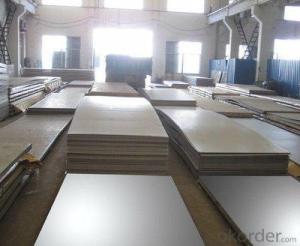Spring Steel Plate AISI 6150 Steel Sheet
- Loading Port:
- China main port
- Payment Terms:
- TT OR LC
- Min Order Qty:
- 30 m.t.
- Supply Capability:
- 10000 m.t./month
OKorder Service Pledge
OKorder Financial Service
You Might Also Like
Item specifice
Spring Steel Plate AISI 6150 Steel Sheet
Product information:
| Measurement | Thickness | Width |
| 6mm~35mm | 40mm~150mm | |
| Edge(Cross Section) | Round edge profile to DIN59145 | Square edge profile to DIN59146 |
| Bundle Weight | Around 2.0 MT | |
| Technique | Hot Rolled | |
| Surface | Grooved | Plain-smoothed |
| Quenchant | Oil/Water | |
| Temper Stressing | 480째C-560째C | |
| Quenching Temprature: | 800째C-1000째C | |
| OEM | Material Composition Offered by Customers | |
| Application | sup9/sup9a/sup10/55Cr3/50CrV4 | Automotive suspension springs |
| sup7/9260/30CrMnB/27CrMnB/1045 | Rotary tools and Blades | |
| Payment Term | 100% L/C at Sight. | 30% T/T Down Payment, Balance Against B/L Copy. |
| Packing | In bundles. Each bundle packed with 2 steel strips and 3 steel wires. | |
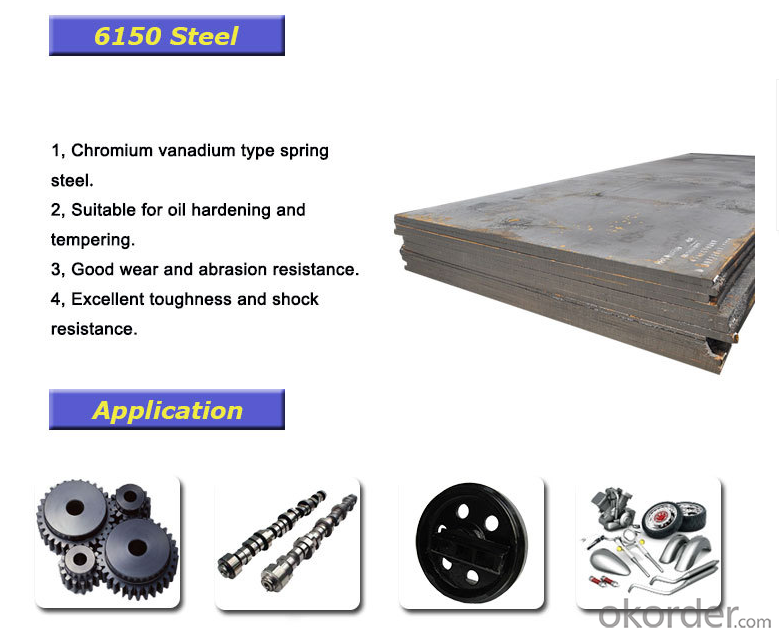
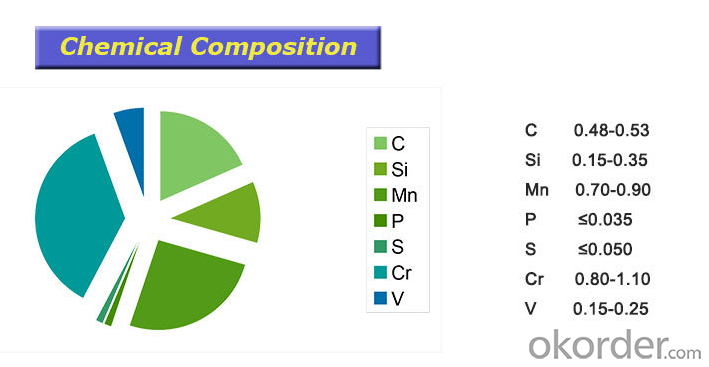
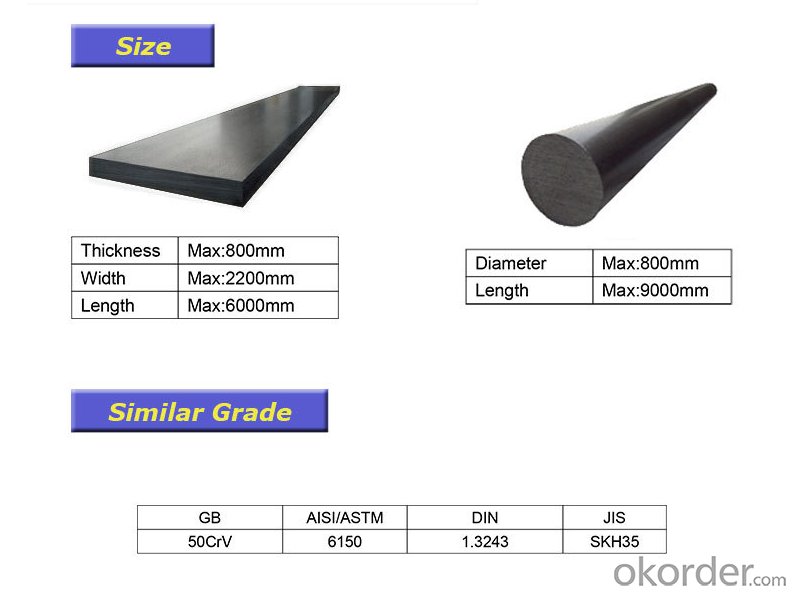
Other products show:
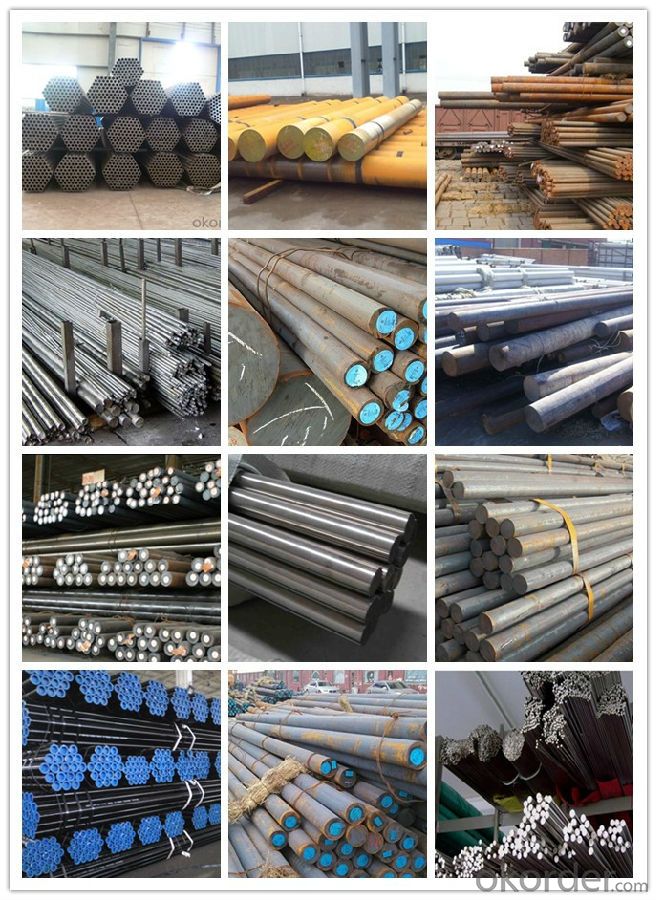
Our workshop show:
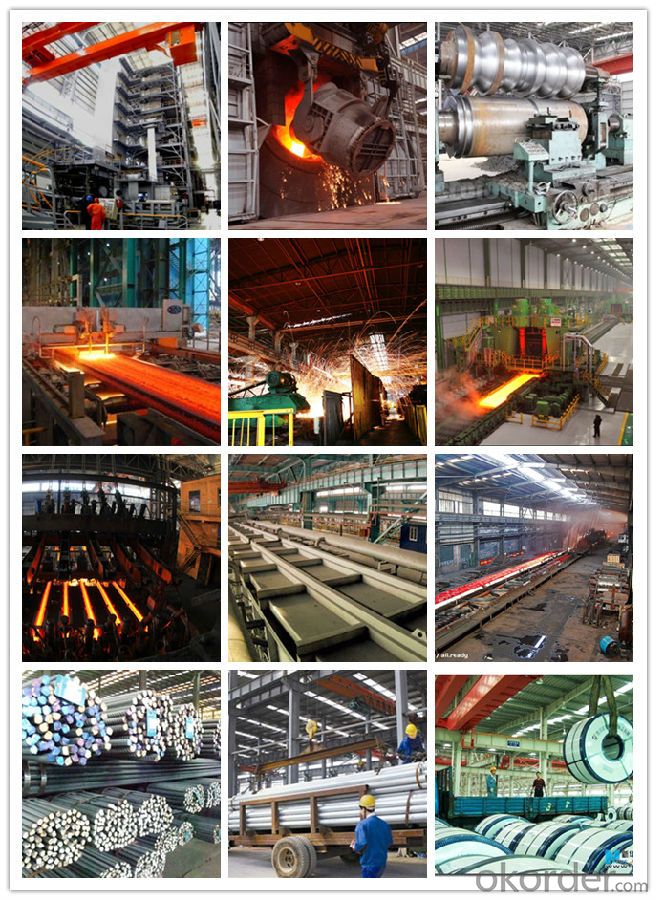
Our service:
-High manufacturing accuracy
-High strength
-Small inertia resistance
-Strong heat dissipation ability
-Good visual effect
-Reasonable price
Chose happens because of quality, then price, We can give you both.Additionally, we can also offer professional products inquiry, products knowledge train(for agents), smooth goods delivery, exellent customer solution proposals.Our service formula: good quality+good price+good service=customer's trust
SGS test is available, customer inspection before shipping is welcome, third party inspection is no problem.
If you need the sample, please feel free to let me know. Any question, we will contact you ASAP!
- Q:What are the specific requirements for special steel used in the food processing industry?
- The specific requirements for special steel used in the food processing industry are stringent due to the critical nature of the industry and the need for maintaining high levels of hygiene and safety. Some of the key requirements for special steel used in the food processing industry include: 1. Corrosion resistance: Special steel used in the food processing industry must have excellent corrosion resistance to withstand exposure to various food products, cleaning agents, and moisture. This helps in preventing contamination and ensures the longevity of the equipment. 2. Hygienic design: The steel used should have a smooth and non-porous surface to prevent the accumulation of food particles, bacteria, and other contaminants. It should be easy to clean and sanitize to maintain high levels of hygiene. 3. Non-reactivity: The steel should be non-reactive with food products to avoid any chemical reactions that may alter the taste or quality of the food. This requirement is particularly important for acidic or alkaline food items. 4. High temperature resistance: Food processing often involves high-temperature applications such as cooking, sterilization, and baking. Special steel used in the industry must have high-temperature resistance to ensure durability and prevent any adverse effects on the food or equipment. 5. Mechanical strength: The steel should have sufficient mechanical strength to withstand the stresses and strains associated with food processing operations. It should be able to withstand impacts, vibrations, and other mechanical forces without deformation or breakage. 6. Compliance with food safety regulations: Special steel used in the food processing industry must comply with relevant food safety regulations and standards. It should be free from harmful substances such as lead, cadmium, and other contaminants that can leach into the food. 7. Traceability: Special steel used in the industry should be traceable, with proper documentation and certification to ensure its origin and quality. This is essential for maintaining transparency and accountability in the supply chain. These specific requirements ensure that the special steel used in the food processing industry meets the highest standards of quality, hygiene, and safety, thus safeguarding the health of consumers and maintaining the integrity of the food products.
- Q:What are the future prospects for the special steel industry?
- The future prospects for the special steel industry are promising. With advancements in technology, increasing demand for high-performance materials in various sectors such as automotive, aerospace, and construction, the special steel industry is expected to witness steady growth. Additionally, the shift towards sustainable and lightweight materials in industries like renewable energy and electric vehicles presents new opportunities for the special steel industry. However, the industry may face challenges in terms of environmental regulations and competition from alternative materials. Overall, the future outlook for the special steel industry looks favorable, driven by technological advancements and evolving market demands.
- Q:What are the main applications of special steel in the defense aircraft?
- Special steel is widely used in defense aircraft for various critical applications. Some of the main applications include the manufacturing of aircraft structural components, such as landing gear, wing spars, and fuselage frames, which require high strength, durability, and resistance to fatigue and corrosion. Special steel is also used for producing engine components, like turbine blades, which require high-temperature resistance and excellent mechanical properties. Additionally, special steel is utilized in the production of armor plating for protection against ballistic threats, reinforcing the overall security and survivability of the aircraft.
- Q:How does special steel contribute to the hardness of products?
- Special steel contributes to the hardness of products through its unique composition and manufacturing process. It contains alloying elements such as chromium, tungsten, and manganese, which enhance its strength and resistance to wear and tear. The controlled heat treatment during production further refines the steel's microstructure, resulting in increased hardness. This hardness enables special steel to withstand high pressures, impacts, and abrasive forces, making it ideal for applications where durability and strength are crucial, such as in tools, machinery, and construction materials.
- Q:How does wear-resistant steel protect against abrasive wear?
- Wear-resistant steel protects against abrasive wear by having a higher hardness and toughness compared to the material it is protecting. This allows it to withstand the impact and friction caused by abrasive particles, reducing the wear and increasing the lifespan of the steel.
- Q:What are the future trends in special steel manufacturing?
- The future trends in special steel manufacturing are likely to focus on advancements in technology, sustainability, and the development of new alloys. Firstly, technology will play a significant role in shaping the future of special steel manufacturing. Automation and robotics are expected to be increasingly integrated into the production process, leading to improved efficiency, precision, and reduced labor costs. This will also allow for better quality control and the ability to produce more complex and customized steel products. Secondly, sustainability will be a key focus in special steel manufacturing. As the world becomes more environmentally conscious, companies are seeking ways to reduce their carbon footprint. This includes employing cleaner production methods, such as using renewable energy sources and implementing recycling programs to minimize waste. Additionally, there will likely be a shift towards developing greener alloys with reduced environmental impact. Furthermore, the development of new alloys will be crucial in meeting the evolving needs of various industries. With advancements in material science, special steel manufacturers will be able to create alloys with enhanced properties, such as increased strength, durability, corrosion resistance, and heat resistance. These new alloys will cater to the growing demand for high-performance materials in sectors like aerospace, automotive, energy, and construction. Moreover, the future of special steel manufacturing is also likely to be influenced by the increasing demand for lightweight materials. As industries strive to improve fuel efficiency and reduce emissions, there will be a need for special steel alloys that offer high strength-to-weight ratios. This will drive research and development efforts towards creating lighter yet stronger steel products. In conclusion, the future trends in special steel manufacturing will revolve around technological advancements, sustainability, and the development of new alloys. These trends will shape the industry, bringing about increased automation, cleaner production methods, and the creation of innovative alloys to meet the changing needs of various sectors.
- Q:What are the different methods of surface lapping for special steel?
- There are several different methods of surface lapping for special steel. These methods are used to achieve a high level of flatness and smoothness on the surface of the steel. One common method is called free abrasive lapping. In this method, a slurry containing abrasive particles is used to polish the surface of the steel. The slurry is typically applied to a rotating lap plate, which is then pressed against the steel surface. The abrasive particles remove material from the surface, resulting in a smoother and flatter surface. Another method is called fixed abrasive lapping. In this method, a rigid lap plate with abrasive particles embedded in it is used to polish the steel surface. The lap plate is typically made of a harder material than the steel being lapped. As the lap plate rotates and is pressed against the steel surface, the embedded abrasive particles remove material, resulting in a smoother surface. Chemical lapping is another method that can be used for special steel. In this method, a chemical solution is applied to the steel surface. The chemical solution reacts with the surface of the steel, dissolving and removing a thin layer of material. This method is often used when a high level of flatness is required. Ultrasonic lapping is a method that uses ultrasonic vibrations to enhance the lapping process. In this method, the steel surface is placed in contact with a bath of abrasive particles and a liquid medium. Ultrasonic vibrations are then applied to the liquid medium, causing the abrasive particles to vibrate and remove material from the surface of the steel. This method can be particularly effective for lapping hard and brittle materials. Overall, the different methods of surface lapping for special steel offer various approaches to achieve the desired level of flatness and smoothness. The selection of the method depends on factors such as the type of steel, the desired surface finish, and the specific requirements of the application.
- Q:How does special steel contribute to the machinability of products?
- Special steel plays a significant role in enhancing the machinability of products. Machinability refers to the ease with which a material can be cut, drilled, or shaped using various machining processes. Special steel, also known as alloy steel, is specifically formulated to contain certain elements that improve its machinability characteristics. One key aspect of special steel that contributes to its enhanced machinability is its composition. By incorporating alloying elements such as manganese, sulfur, and phosphorus, special steel achieves improved machinability compared to regular carbon steel. These elements help in reducing friction during machining operations, resulting in reduced tool wear and extended tool life. Additionally, the presence of these elements facilitates the formation of smaller and more manageable chips during cutting, making it easier to control the machining process and maintain dimensional accuracy. Moreover, special steel often undergoes specific heat treatment processes, such as annealing or quenching and tempering, to further enhance its machinability. Heat treatment improves the steel's microstructure, making it more uniform and refined, which in turn improves its machinability characteristics. Heat-treated special steel exhibits better hardness, toughness, and resistance to wear, all of which are crucial for achieving high-quality machined products. Furthermore, special steel can be engineered to possess other desirable properties, such as high strength, corrosion resistance, or heat resistance, while still maintaining good machinability. This versatility allows manufacturers to select the most suitable special steel for their specific machining applications, ensuring optimal performance and productivity. In conclusion, special steel significantly contributes to the machinability of products due to its specific composition, heat treatment processes, and versatile properties. By utilizing special steel, manufacturers can achieve better machining performance, improved tool life, and higher dimensional accuracy, ultimately leading to superior quality products.
- Q:How is electrical steel used in the manufacturing of transformers?
- Electrical steel, also known as silicon steel, is crucial in the manufacturing of transformers due to its unique magnetic properties. It is used to construct the core of the transformer, which is responsible for transferring electrical energy from one circuit to another. The high magnetic permeability and low core losses of electrical steel help enhance the efficiency and performance of the transformer by reducing energy losses during the conversion process.
- Q:What are the main applications of special steel in the food packaging industry?
- Special steel is widely used in the food packaging industry due to its various applications. It is primarily utilized in the production of food cans, closures, and other packaging materials. Special steel offers excellent corrosion resistance, ensuring the preservation and safety of the packaged food. It also provides high strength and durability, maintaining the integrity of the packaging during transportation and storage. Additionally, special steel can be easily formed into different shapes and sizes, allowing for versatile packaging designs. Overall, the main applications of special steel in the food packaging industry include ensuring food safety, promoting product longevity, and enabling creative packaging solutions.
1. Manufacturer Overview |
|
|---|---|
| Location | |
| Year Established | |
| Annual Output Value | |
| Main Markets | |
| Company Certifications | |
2. Manufacturer Certificates |
|
|---|---|
| a) Certification Name | |
| Range | |
| Reference | |
| Validity Period | |
3. Manufacturer Capability |
|
|---|---|
| a)Trade Capacity | |
| Nearest Port | |
| Export Percentage | |
| No.of Employees in Trade Department | |
| Language Spoken: | |
| b)Factory Information | |
| Factory Size: | |
| No. of Production Lines | |
| Contract Manufacturing | |
| Product Price Range | |
Send your message to us
Spring Steel Plate AISI 6150 Steel Sheet
- Loading Port:
- China main port
- Payment Terms:
- TT OR LC
- Min Order Qty:
- 30 m.t.
- Supply Capability:
- 10000 m.t./month
OKorder Service Pledge
OKorder Financial Service
Similar products
New products
Hot products
Related keywords
